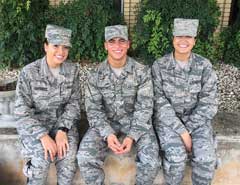May 18th, 2017
By Air Force Airman Chad Gorecki
375th Air Mobility Wing
SCOTT AIR FORCE BASE, Ill., May 18, 2017 — For one Algerian family, 6,600 miles was the distance between a life of struggle and a life of promise and opportunity.
 The Harchaoui triplets -- from left, Myriam, a 436th Supply Chain Operations Squadron at Scott Air Force Base, Ill.; Rabah, assigned to the 56th Security Forces Squadron at Luke Air Force Base, Ariz.; and Warda, with the 60th Medical Operations Squadron at Travis Air Force Base, Calif. -- were born in Algeria before moving to the United States. Courtesy photo
The Harchaoui triplets -- from left, Myriam, a 436th Supply Chain Operations Squadron at Scott Air Force Base, Ill.; Rabah, assigned to the 56th Security Forces Squadron at Luke Air Force Base, Ariz.; and Warda, with the 60th Medical Operations Squadron at Travis Air Force Base, Calif. -- were born in Algeria before moving to the United States. Courtesy photo
Their journey has carried them from a barren region in Africa to California's Simi Valley, where eventually the Harchaoui triplets -- Myriam, Rabah and Warda -- would join the U.S. Air Force.
"Growing up we were very poor," said Air Force Airman Myriam Harchaoui, a 436th Supply Chain Operations Squadron C-130 stock control apprentice here. "Our mom fought for us to move to the states because of life [in Algeria]. It was like the movies: a desert with a ton of beat-up buildings."
Her mother, Brigit Wilcox, arrived in California at first with just the three boys in the family, leaving Myriam and her sister, Warda, in the care of grandparents. They were not able to come at the same time because the government allowed only the boys to leave, but when the girls reached age 5, they were able to rejoin their family.
Adjusting to New Culture
When they arrived, they didn't speak English and had to adjust to the different culture. Myriam said she was able to pick up the language quickly, and Warda, now an airman assigned to the 60th Medical Operations Squadron at Travis Air Force Base, California, said she learned the language through the Boys and Girls Club.
Their brother, Rabah -- an airman assigned to the 56th Security Forces Squadron at Luke Air Force Base, Arizona -- was 2 when he moved to the United States from Algeria, so it's all he's really known.
"Growing up here gave me a lot of opportunities, and it has been a blessing so far," he said.
After graduating from high school, the Harchaouis saw the Air Force as a good option because their older brother, Sofiane, had served six years as an F-16 avionics specialist. Additionally, the triplets were a part of their high school's Junior ROTC, so they were introduced to the idea of the military early.
Different Reasons for Enlisting
In 2016, the triplets each raised their right hand in commitment to the Air Force, and they each had their own reason for doing so.
Myriam said, "When I was younger, I always wanted to join. … The government had done so much for us and getting my family to the states, [so] I saw it as a way to give back."
Warda and Rabah said they saw the opportunities the military lifestyle offered.
"Having a single mother with five children, we couldn't all be put through college," she said. "I wanted to avoid the mistake of going through college right away and not knowing what I wanted to do, and I saw what the Air Force was able to offer."
For Rabah, the military was a stepping stone for life after high school that could also provide college opportunities.
Supportive Mother
Even with all of the benefits the military life has offered, Myriam said this has been the longest they have been apart since those early years, and it has been difficult for them and especially for their mother. Still, she added, their mother has remained very supportive of their decisions.
"It went from all of us being together at home to everyone being gone," Myriam said. "It was a fast change for her, but she is OK with it, because having our brother already serve, she knew the military would take care of us. It has been hard, but she has been very optimistic, because she has always wanted the best for us and she pushed us to be successful."
The distance that comes with being members of the military has been tough on the family, but it also has helped to strengthen the bond among them. The triplets stay in touch with each other through a group chat where they talk every day, Myriam said.
"We always communicate, which has made it easier to get through some of the tough times in the military so far," Myriam said. "Communication has been key. "We can all motivate each other, and we are in this together. Even though we aren't under the same roof, we are still together in heart." back...
375th Air Mobility Wing
SCOTT AIR FORCE BASE, Ill., May 18, 2017 — For one Algerian family, 6,600 miles was the distance between a life of struggle and a life of promise and opportunity.
 The Harchaoui triplets -- from left, Myriam, a 436th Supply Chain Operations Squadron at Scott Air Force Base, Ill.; Rabah, assigned to the 56th Security Forces Squadron at Luke Air Force Base, Ariz.; and Warda, with the 60th Medical Operations Squadron at Travis Air Force Base, Calif. -- were born in Algeria before moving to the United States. Courtesy photo
The Harchaoui triplets -- from left, Myriam, a 436th Supply Chain Operations Squadron at Scott Air Force Base, Ill.; Rabah, assigned to the 56th Security Forces Squadron at Luke Air Force Base, Ariz.; and Warda, with the 60th Medical Operations Squadron at Travis Air Force Base, Calif. -- were born in Algeria before moving to the United States. Courtesy photoTheir journey has carried them from a barren region in Africa to California's Simi Valley, where eventually the Harchaoui triplets -- Myriam, Rabah and Warda -- would join the U.S. Air Force.
"Growing up we were very poor," said Air Force Airman Myriam Harchaoui, a 436th Supply Chain Operations Squadron C-130 stock control apprentice here. "Our mom fought for us to move to the states because of life [in Algeria]. It was like the movies: a desert with a ton of beat-up buildings."
Her mother, Brigit Wilcox, arrived in California at first with just the three boys in the family, leaving Myriam and her sister, Warda, in the care of grandparents. They were not able to come at the same time because the government allowed only the boys to leave, but when the girls reached age 5, they were able to rejoin their family.
Adjusting to New Culture
When they arrived, they didn't speak English and had to adjust to the different culture. Myriam said she was able to pick up the language quickly, and Warda, now an airman assigned to the 60th Medical Operations Squadron at Travis Air Force Base, California, said she learned the language through the Boys and Girls Club.
Their brother, Rabah -- an airman assigned to the 56th Security Forces Squadron at Luke Air Force Base, Arizona -- was 2 when he moved to the United States from Algeria, so it's all he's really known.
"Growing up here gave me a lot of opportunities, and it has been a blessing so far," he said.
After graduating from high school, the Harchaouis saw the Air Force as a good option because their older brother, Sofiane, had served six years as an F-16 avionics specialist. Additionally, the triplets were a part of their high school's Junior ROTC, so they were introduced to the idea of the military early.
Different Reasons for Enlisting
In 2016, the triplets each raised their right hand in commitment to the Air Force, and they each had their own reason for doing so.
Myriam said, "When I was younger, I always wanted to join. … The government had done so much for us and getting my family to the states, [so] I saw it as a way to give back."
Warda and Rabah said they saw the opportunities the military lifestyle offered.
"Having a single mother with five children, we couldn't all be put through college," she said. "I wanted to avoid the mistake of going through college right away and not knowing what I wanted to do, and I saw what the Air Force was able to offer."
For Rabah, the military was a stepping stone for life after high school that could also provide college opportunities.
Supportive Mother
Even with all of the benefits the military life has offered, Myriam said this has been the longest they have been apart since those early years, and it has been difficult for them and especially for their mother. Still, she added, their mother has remained very supportive of their decisions.
"It went from all of us being together at home to everyone being gone," Myriam said. "It was a fast change for her, but she is OK with it, because having our brother already serve, she knew the military would take care of us. It has been hard, but she has been very optimistic, because she has always wanted the best for us and she pushed us to be successful."
The distance that comes with being members of the military has been tough on the family, but it also has helped to strengthen the bond among them. The triplets stay in touch with each other through a group chat where they talk every day, Myriam said.
"We always communicate, which has made it easier to get through some of the tough times in the military so far," Myriam said. "Communication has been key. "We can all motivate each other, and we are in this together. Even though we aren't under the same roof, we are still together in heart." back...


